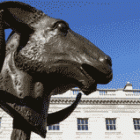Index relies entirely on the support of donors and readers to do its work.
Help us keep amplifying censored voices today.
 A panel discussion to coincide with the installation of Ai Weiwei’s Circle of Animals / Zodiac Heads at Somerset House
A panel discussion to coincide with the installation of Ai Weiwei’s Circle of Animals / Zodiac Heads at Somerset House
Monday 23rd May 17
Portico Rooms, Somerset House
19.00-20.30
Padraig Reidy, Index on Censorship’s News Editor, will join a panel comprising Dr Anne Alexander of Cambridge University, Dr Joss Hands, author of @ is for Activism and Sunny Hundal, Editor of Liberal Conspiracy blog, to debate the wider impact of the internet and social media in particular on the practice of 21st century politics and the nature of protest movements.
The upheavals sweeping the Arab world have been hailed by some as the Twitter revolutions. But just how influential a role has social media really played in the fall of dictatorships?
Zainab Alkhawaja, daughter of human rights activist and former president of the Bahrain Centre for Human Rights, Abdulhadi Alkhawaja, has gone on hunger strike demanding that authorities release her father and three other members of her immediate family.
Security forces are alleged to have used excessive and violent force in apprehending the suspects in their private residence without any search or arrest warrants. Zainab has also written an open letter to US president Barack Obama urging him to help free her family. Meanwhile on Twitter, seven other activists have vowed to join in the hunger strike.
The three Twitter subscribers whose personal information has been subpoenaed by the US government in connection with its investigation into WikiLeaks have appealed the court order that declared their account details unprotected by rights to privacy and free speech.
A district judge in Virginia ruled 11 March that Twitter must turn over the account information of Icelandic parliamentarian Birgitta Jonsdottir, Dutch businessman Rop Gonggrijp and U.S. activist Jacob Appelbaum. The judge, Theresa Buchanan, further rejected a motion by lawyers for the three to publicly disclose which other Internet companies had been secretly subpoenaed by the government for personal user information in the case.
The American Civil Liberties Union and Electronic Frontier Foundation appealed the decision on Friday on behalf of the three users, asking a US district judge to overturn the earlier ruling. The lawyers argue that the public has a significant interest in obtaining access to documents in the case that remain sealed (which could reveal that companies such as Google have been put in a similarly compromising position as Twitter).
The government is seeking access to all of the users’ information — including IP addresses — across an extended period of time, regardless of whether that “Twitter-related speech” had anything to do with WikiLeaks.
“The Twitter order’s breadth is especially significant because the Parties use Twitter extensively and/or have thousands of ‘followers’ who follow what they post,” the appeal states, “and each publishes many Twitter messages wholly unrelated to WikiLeaks, including Tweets discussing Tibet and Tunisia, the Icelandic Volcano, the Transportation Security Administration, obscenity and gay marriage laws.”
The lawyers argue that because of this broad net, the subpoena does not satisfy standards under the Stored Communications Act that the government must provide “specific and articulable facts” suggesting the information is relevant to an ongoing criminal investigation.
Buchanan reasoned that the three users had already made their Twitter posts and associations public through the networking site. But the EFF and ACLU counter that the subpoena seeks significant information that is currently private — including the geographic location of the users when they posted messages, and the identity and location of every user with whom they exchanged private messages.
“It is all private,” the appeal states of the information requested by the government. “The Twitter Order thus has a chilling effect not only on the Parties’ speech and association rights, but on the rights of Twitter users in general, including the Parties’ followers, who will now fear that the government may secretly track their activities, seize their account information, and even map their movements and associations based on what they say about matters of public concern or with whom they communicate regarding political issues. As the Supreme Court has cautioned ‘[t]hese freedoms are delicate and vulnerable, as well as supremely precious in our society.'”
New York City Ballet bosses have taken the decision to censor their dancers’ tweets. This move was announced after Devin Alberda ridiculed a major donor and wrote disparaging remarks about the director’s arrest for drink-driving. He has allegedly been “silently booing” benefactor David Hoch, who has donated $100 million to the company to fund the Lincoln Center theatre.